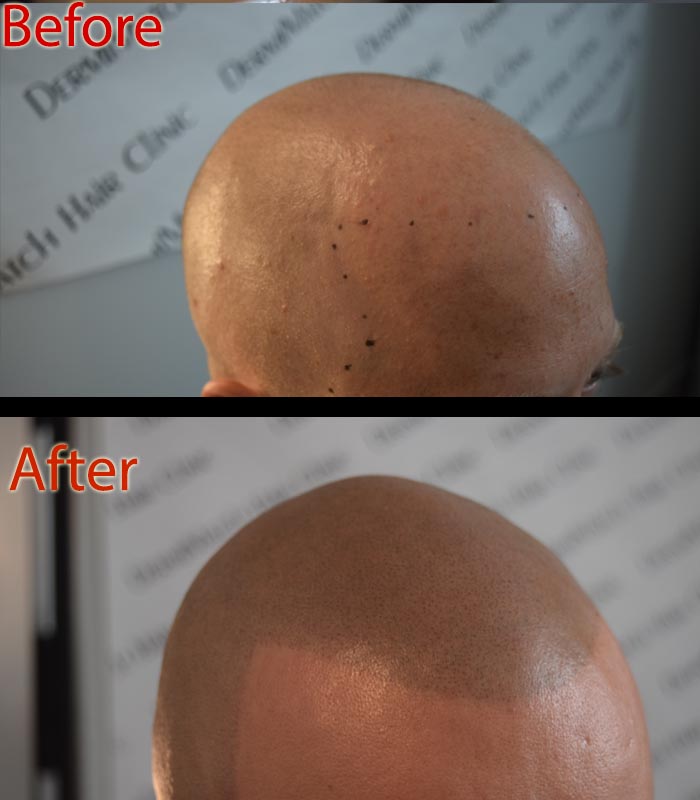The cases of male pattern baldness are rising. Statistics reveal that 80% of males above 50 years of age suffer from a significant amount of hair loss. Another shocking fact is that hair loss starts in men at about 21 years of age, with 25% suffering from pattern baldness. This has an adverse impact on the self-esteem and confidence of men.
Male pattern baldness is characterized by the gradual loss of hair, which shows up as:
- Total body hair loss
- Slow yet progressive hair thinning
- Circular patches of baldness
Due to the rising incidence of hair loss and male pattern baldness, a majority of the affected men look for a hair restoration solution. It is no wonder that scalp micropigmentation comes up as a non-invasive procedure.
Causes of Male Pattern Baldness Baldness
Hair loss can severely affect the self-esteem of a person, causing stress, depression, and anxiety.
Men suffer from hair loss due to hereditary factors. Androgenic alopecia is often blamed on genes and begins with a receding hairline. Gradually, bald spots take over.
Another common cause of male hair loss is hormonal imbalance. Hair thinning often results in men suffering from alopecia areata, which causes male pattern baldness. Due to the autoimmune condition, antibodies start attacking hair follicles, resulting in hair thinning.
Certain medications can also cause a loss of hair. This includes chemotherapy drugs and depression, and arthritis medications, among others.
Additionally, certain types of hairstyles can cause excessive pulling of hair. Overexposure to heat is another cause of hair loss, as it can weaken the roots and damage the scalp and affect hair growth.
Is SMP for Male Pattern Baldness Worth it?
Scalp micropigmentation is a hair restoration option for males with reservations about a surgical procedure. It is a safer method to hide scalp imperfections that are causing you a loss of self-confidence. A professional scalp artist is trained in the application of pigment that matches the client’s hair and scalp. However, it is only a way to cover the scalp flaws and not spur the growth of hair. There are a few SMP aftercare tips to follow to avoid any side effects from the non-invasive procedure.
Don’t Touch It
When the scalp session is complete, your scalp is still in the healing process. Touching the scalp might make you prone to infection and cause itching or irritation. You should try not to touch the scalp for the first 4 days to allow it time to heal properly. Avoid shaving at any cost for the first 3-4 days for the same reasons.
Don’t sweat
Perhaps you want to get back to life as usual quickly but it is in your best interest to avoid any physical activity that causes you to sweat profusely. Doing light exercise is okay but excessive sweating can cause the pigment to fade. Let it heal for 3-4 days before going back to the gym.
Avoid water
Any activity that results in a water splash on your head should be better avoided in the first 4 days. In fact, you should avoid swimming or sauna. Try to use normal water, which should not be hot for the shower. This is to ensure that hot water does not trigger sweating.
Moisturize
Your skin should not feel dry so the application of a chemical-free moisturizer is the right way to take care of your scalp. But only after the first 4 days. Moisturizing will keep flakiness away when you are undergoing SMP for male pattern baldness.
Avoid using a razor
After 4 days, you may shave your head. But avoid using a razor to prevent any irritation, swelling, or redness. An electric shaver might be a good choice to reduce the risk of itchiness, bumps, or irritation.
Proper scalp aftercare can help you enjoy long-lasting SMP results. but the first step is to consult with the top SMP practitioner in Arizona, who can guide you through the process and also help you determine if scalp micropigmentation is right for you. For more information on SMP, DermiMatch can help.

